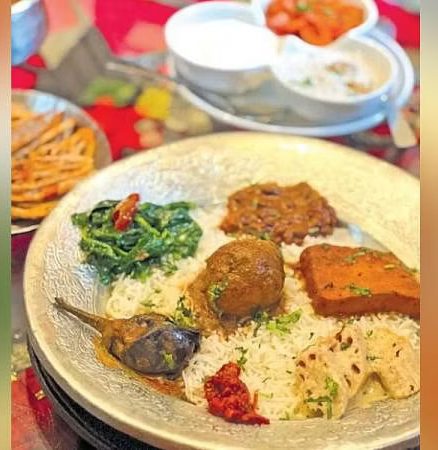Almost a three decades-old chain, it has been an integral part of any write-up to do with the capital’s early fine-dining scene.
Last week, just before Delhi turned into Mumbai with its incessant and impossibly beautiful spell of midsummer rainfall, I met a friend for a hearty Kashmiri meal that we’d been contemplating for a while. Chor Bizarre, once a chain of restaurants specialising in the Kashmiri cuisine, now has only one outlet — in the stately Bikaner House in Central Delhi.
Almost a three decades-old chain, it has been an integral part of any write-up to do with the capital’s early fine-dining scene. Chef Srinivas, who helms the kitchen, showed me the ornate, eclectic interior — with plenty of tiny items that do justice to its name. This, as he noted, is why the restaurant is named so.“Each item in our decor is unique and almost antique,” he said, pointing towards the miniatures of dressing tables of an era gone by that adorn one side of the wall — and a table with the base of an old sewing machine. But enough digression — let’s come to what they serve, and why I’m talking about a single restaurant here in a city of a thousand such ventures.
While Kashmiri cuisine is more meat-centric, for our afternoon, we picked their vegetarian ‘traami’ — a set meal. A traditional wazwan traami is a pre-plated meal where different dishes are served on a bed of steamed rice. Our traami came with steaming hot rice, lal paneer, dum olav (dum aloo), chokh wangun (khatte baingan), nadru yakhni, haaq, rajma and muj chatting (mooli chutney) — truly a kaleidoscope of flavours and a fine representation of the region’s cuisine.
To complement the subtle, nuanced flavours of the traami, we were tempted to try the kong phirni, followed by kehwa to sum up this rather scrumptious meal. The meal got me thinking about the first time that I tasted Kashmiri food in Mumbai, at restaurateur Jasleen Marwah’s place, who was a home chef then. She originally hails from the Sikh community of Kashmir, and still has her roots in Srinagar. Through her home-kitchen ‘Namak’, she introduced me to the nuances of Kashmiri cuisine and its two styles of cooking. It is from her that I learnt to make a near-perfect Kashmiri dum olav, that is very different from the creamy dum aloo that we have been exposed to in the restaurants claiming to be serving “authentic” dishes.
The dish might be the simplest to make if you hear the recipe, but is actually a work of art and patience.
“Kashmiris migrated to various places in search of better opportunities, and then after the regional conflicts — with that migration, their food travelled to those regions as well”, explains Rohini Kaul, who helms The Kashmiri Kitchen, a home-kitchen based out of Mayur Vihar, in East Delhi. Kaul has joined hands with her mother, Sudha, to dedicate themselves into taking their family recipes to newer audiences outside of the Kashmiri community. They are also documenting old recipes like Kabargah, Zami Kand, Kathal dum and more, before they are lost to time.“It is important to blend the traditional with modern, to adapt with the times and the region, and its taste. While we continue to make traditional Kashmiri ghar ka khana, we also realise that adapting to the current geography and tweaking our recipes to suit a region is also necessary,” Kaul said.
In Gurugram, Nalini Moti Sadhu and her husband Surender, run the Kashmiri cuisine restaurant Matamaal. Its beautifully poetic name means “grandmother’s home” in the regional language, and it is befitting too, as the food is inspired by Sadhu’s maternal grandmother and mother-in-law. Serving traditional Kashmiri Pandit cuisine in the heart of the city, Matamaal has garnered love from the locals and accolades of the food experts. In fact, one can also order Kashmiri ingredients and artefacts from their online shop.
Over the past few years, we’ve seen a rise in people’s interest and intent to explore their roots, a big part of which is played by food. After all, regional food is all about tasting geographies, even if you are far removed from a region. They call Kashmir as the heaven on earth — perhaps there is no better sign of that than the fact that every Kashmiri food venture has much more than food to ferry, a longer story than a novel to narrate.
Source/Credit – New Indian Express

